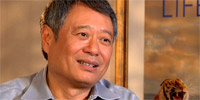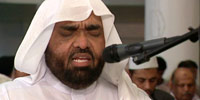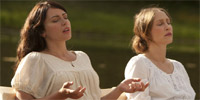TEACHER: Wadjda. Come here.
HAIFAA AL-MANSOUR (Director and Writer, Wadjda): It's a coming of age story about a young girl who is 10 years old. She's feisty and has a great sense of humor and she's in love with this green bicycle.
Saudi Arabia is very conservative when it comes to women and all that and she's trying to assert herself and find her voice in a society where sometimes women are not heard. If you grow up in Saudi, religion is present every day. You cannot escape it. It becomes more than just being a good Muslim or not a good Muslim. It becomes part of the life.
What we see in the school is where things have to be more strict and more the very conservative interpretation of Islam.
TEACHER: Pictures are forbidden at school. Let’s get started. Surat A’nissa’, page 97.
AL-MANSOUR: The religion of the mother. She's religious, but she likes to sing, she's a woman in love. So for me those are two types. On is personal like the mother. One is personal, intimate. And one is more about militant and about constitutional, about making people almost like soldiers in a certain way.
TEACHER: The Koran competition is five weeks away.
HEADMASTER: We’ve increased the prize money. It’s now 1,000 riyals.
AL-MANSOUR: I think the Koran is very full of beautiful imagery.
WADJDA: I’d like to join the Koran competition.
HEADMASTER: All of the sudden?
AL-MANSOUR: It is like any other religious text, it is a lot about how you interpret it and I think it's very important for religion to be personal, to be intimate, to be a relationship between a person and God and for trying to be a better human being.
WADJDA: Who were you talking to about my bike yesterday?
SHOPKEEPER: What are you talking about?
WADJDA: I don’t want you selling my bike to anyone else. Here. I made you a mixtape, since we’re friends now. But don’t sell my bike.
SHOPKEEPER: God willing!
AL-MANSOUR: I wanted a character that changes her destiny. It is easy to give up and to say the situation is bad in the Arab world and this woman is bad and this is what happens and then what?
There are men who are very supportive and are very kind, like Abdullah, the guy, the boy and for me his character is such an amazing character because in the Arab world men think to be charming you have to be always like a boss an in control.
ABDULLAH: I’ll give you my bike.
WADJDA: Then how will we race?
ABDULLAH: Wadjda? I want to marry you when you’re older.
AL-MANSOUR: The Arab world will always be a religious place. There is no way that Arabs, that a place like Saudi people will not be religious, but there is a difference between being very militant and having this very conservative interpretation of religion or shifting it to a religion that is more about tolerance, about accepting, about love and about more of courtesy and all the things that I think the Arab world needs. It needs to have patience and heart. And those values are very much embedded in any religion.
WADJDA: So do you love him?
MOTHER: Who? Your father?
WADJDA: No, the neighbor’s boy!
MOTHER: I don’t think I’m the one in love with the neighbor’s boy!
WADJDA: That’s not funny!
AL-MANSOUR: It was very important for me to, to make a film that is emotional and moving and entertaining and hoping people will see it back home and just enjoy watching a film and associate themselves with a film and not be so militant and not to be so conservative, maybe relax a little. It's important not to see ourselves as us against the world. It's more of us with the world.






